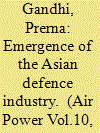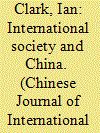|
|
|
Sort Order |
|
|
|
Items / Page
|
|
|
|
|
|
|
| Srl | Item |
| 1 |
ID:
139195


|
|
|
|
|
| Summary/Abstract |
East Asia is a region of contradictions. While it contributes an equal share to world Gross Domestic Product (GDP) as North America, it is also home to four flashpoints: the Taiwan Straits, Korean Peninsula, East China Sea and South China Sea. Countries in the region are bound to each other by economic linkages through trade and production networks, which have led the region to have a joint stake in its shared prosperity. However, increasing economic interdependence, while being a deterrent for conflict, falls short of becoming a cause for peace. Inability to resolve the historical legacies and boundary disputes, the competition for resources, the rise of China, the US pivot to Asia, the unstable regime of North Korea and the changing Japanese security identity are some of the multifarious security problems for the region. This constant clash of strategic aspirations to dominate the region ensures that military instruments will play a critical role in Asia.
|
|
|
|
|
|
|
|
|
|
|
|
|
|
|
|
| 2 |
ID:
133956


|
|
|
|
|
| Publication |
2014.
|
| Summary/Abstract |
The core suggestion of this article is that we make best sense of the concepts of power, legitimacy, and responsibility within a framework of international society. This framework is illustrated by, and applied to, the specific case of China's rise. In the light of its historical background, a rising China faces a major paradox. Seemingly, the prerequisite for it to exercise greater influence on the norms of international society is yet further assimilation into them: in order to become a respected norm maker, China must first be seen to be fully integrated as an appropriate norm taker. To be in a position to influence the norms of international society, China must seemingly firstly resolve any lingering ambiguities about its membership. In short, should the debates about China's status be understood as an expression of the power of norms (where China is assessed relative to some universal standard of responsibility), or are they better viewed as the deployment of the norms of power in such a way as to impact its social distribution to China's disadvantage (by imposing the self-interested standards of the liberal states)?
|
|
|
|
|
|
|
|
|
|
|
|
|
|
|
|
| 3 |
ID:
129673


|
|
|
|
|
| Publication |
2014.
|
| Summary/Abstract |
Since the year 2000, several South American countries strongly invested in armaments. At the same time, they increasingly resorted to diplomacy and cooperative institutions to maintain peace. This paper establishes a nexus between motivations for re-armament and recent debates on regional security governance and the emergence of regional powers. Most traditional theories have considered armament to be a function of either the perception of external threat or the availability of economic means. In contrast, this article contends that the rise in arms spending cannot be understood without taking into consideration: (a) the coexistence of a stable power balance, security community thinking and practices in regional security governance; and (b) the desire of emerging states to increase their regional or global roles. This analysis emphasizes non-conflict-driven external motives for military procurement as a new and vital determinant, largely neglected in previous research on the region's military spending. Case studies of three major South American spenders, Brazil, Chile and Venezuela, underscore the significance of non-conflict-driven external factors in military procurement. Their experience shows how emergence of regional powers has the potential to offset the contradictions between conventional security logics, as the tendency of states to purchase arms for non-conflict-related reasons equally supports balance of power and security community thinking.
|
|
|
|
|
|
|
|
|
|
|
|
|
|
|
|
|
|
|
|
|